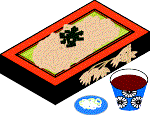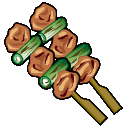 Home
Home 
Japan is an Asian country that has many interesting facts concerning it.
Did you know that it is considered quite rude to blow your nose in public?
Did you know that in 1192 Yortomo was named the first shogun by the emperor? His family ( the Minamoto clan) governed Japan. Did you know that the Japan`s National Anthem`s name is Kimigayo? It means "His Majesty`s Reign." Did you know that there is a meaning for that boring little red dot on Japan`s flag? The boring little red dot stands for the sun. Did you know that in Japan they have Poke'mon cards? They call them Poke'monsters.
Japan is made up of
·
Japan is
70% mountains
·
Japan is
made up of over 6000 islands
·
Kris and
Jessica live in Japan
·
There
are wild monkeys in Japan
·
Wild
monkeys don’t like to be looked at in the eye
·
The
Japanese Prime Minister is elected by the legislature, not the people
·
Legend
says that the Japanese monarchy began in the 7th Century BC
·
In Japan
they eat squid, octopus, eel, all fish, crabs, prawns, etc…
·
A
traditional Japanese breakfast consists of rice topped with natto (fermented soy
beans)
·
The
Japanese say that the Chinese will eat anything
·
Golden
Retrievers are the most popular pet
·
The
Japanese use four different writing systems
·
In
Japanese, the word for “wrong” and “different” are the same
·
American
shows shown in Japan are: Ally McBeal, Dharma and Greg, Beverly Hills 90210,
Full House, Sabrina the Teenage Witch, Boy Meets World, Animal Rescue Kids
·
In
Japan, Ally Mc Beal is called “Ally My Love” because McBeal when said in a
Japanese dialect sounds like McBeer
·
Junior
High and High School students wear uniforms
·
Elementary
school students wear yellow caps
·
In
Japan, the teachers move from class to class and the students stay in one room
·
At
McDonalds the hamburgers are the same size as in America, but the drink sizes
are one size smaller
·
“McDonalds”
in a Japanese dialect sounds lilke “Ma-ku-do-na-ru-do”
·
Japanese
is hard (Nihongo wa muzukashi des)
·
In Japan
it is not uncommon to see women wearing platform shoes that are 4 to 6 inches
high
·
Instead
of “Ohayo Gozaimasu” (good morning), Japanese youngsters often say “Oha!”
·
Christianity
comprises less than 10% of the Japanese population
·
Normal
Japanese kitchens don’t have ovens
·
The
bathroom is not where the toilet is found in a Japanese home
·
In
Japan, when you move into an apartment, you have to bring your own light
fixtures
·
There’s
no such thing as central heat and air in Japan
·
A futon
is not what you think it is…
·
One US
dollar is approximately 120 yen
·
You
don’t wear shoes in the house, you wear slippers
·
There
are special slippers for the toilet
·
You
don’t wear your slippers into a tatami mat room
·
In
Japan, a night at the movies will cost you $18 per person
·
In Japan
you get really good (annoying???) service when shopping
·
Japanese
department stores are usually multiple stories, with a grocery store on the
bottom, clothes and bedding in the middle, and restaurants on the top
·
Japanese
pizza has mayonnaise, corn, and seaweed on it
·
Japanese
salad has corn in it
·
The
Japanese think that Americans eat corn and potatoes every day
·
Fruit is
very expensive in Japan
·
Watermelons
in Japan can cost up to $100
·
Peaches
are $2.00 a piece
·
There
are Japanese people in Japan
·
The
second highest population is Chinese, followed by Korean, Brazilian, Peruvian…
·
There
are very few public trashcans in Japan
·
A
traditional Japanese toilet looks like a urinal lying on the floor
·
In
Japan, they know more about Chinese food than Americans do
·
In Japan
even local calls are charged by the minute
·
In Japan
you eat your soup with chopsticks
·
In Japan
many people wear uniforms i.e. bank tellers, grocery store clerks, postal
workers…
·
In
Japan, most people say that they are Buddhist, but don’t believe in the Buddha
·
Aspiring
young Japanese musicians play on street corners and in
subway stations hoping to
get discovered
·
The
“WALK” lights on Japanese street corners make a chirping sound so that the
blind can know when to cross the street
·
Japanese
subways are very clean and safe
·
People
sleep on their way home on the subway and the train
·
Japanese
cars are mostly the same size as American cars
·
In Japan
they drive on the left side
·
Japanese
streets are very narrow
·
Streets
in Japan don’t have names
·
Pokemon
is not popular in Japan
·
Rice
cookers are great
·
In
Japan, fair skin is regarded as
beautiful
·
Many
Japanese women dye their hair brown
·
Refrigerators
in Japan are tiny
·
There
are very few original castles in Japan because of bombing during WW2
·
Whale is
a delicacy
·
Everyone
hangs their clothes outside to dry
·
Japan is
the world’s largest consumer of tropical rainforest timber
·
Japan
has 28 National Parks and 55 Quasi-National Parks
·
Japan is
divided into nine large regions and further divided into 47 smaller prefectures
·
Japan
has the seventh largest population in the world
·
You can
catch a train to and from Nagoya every 15 minutes
·
You can
catch a subway train every three minutes in Nagoya
·
The
Shinkansen (bullet train) passes Kris and Jessica’s house every fifteen
minutes
·
The
Japanese know more about American politics than Americans do
·
Popular
Japanese bands are: Glay, Smap, Hana Hana, Shingo Mama, The Yellow Monkey, Luna
Sea, Whiteberry, Arc~en~Ceil, Da Pump, Kinki Kids, etc…
·
Popular
Japanese music is terrible
·
Western
celebrities in Japanese commercials are: Catherine Zeta-Jones for Lux Super Rich
Shampoo, Cameron Diaz for Aeon Language School, Ewan McGregor for Aeon Language
School, Nicholas Cage for Pachinko (what a dork), Brad Pitt for both Roots
canned coffee and jeans, Tiger Woods for Wonda canned coffee, George Clooney for
Toyota, Naomi Campbell for Lipton Canned Tea
·
In Japan
you can buy canned coffee, hot or cold, in vending machines
·
In
Japan, Pert shampoo is called Rejoy
·
In
Japan, 20 capsules of cold medicine cost $15
·
Because
Japan has a socialized medical system, if you get the tiniest bit sick people
think you should go to the doctor so you can get your medicine for free instead
of paying $15 for cold medicine
·
Kyoto
and Nara were consciously spared from bombing during World War 2 because of the
cultural significance of their architecture and way of life
·
The name
“Tokyo” when broken down into kanji means “east” and “capital”
·
The name
“Kyoto” when broken down into kanji means “capital” and “capital”
·
Noh, a
type of Japanese theatre, can be up to eight hours long
·
In
Japanese, languages all end in –go : Nihongo, Eigo, Spango, etc…
·
In
Japanese, citizen terms end in –jin : Nihonjin, Amerikajin, Perujin,
etc…